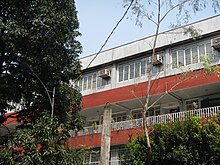St. Paul University Quezon City
 | |
Former names | St. Paul College Quezon City (1946-) |
|---|---|
| Motto | Caritas Christi Urget Nos (Latin) |
Motto in English | The charity of Christ urges us |
| Type | Private Roman Catholic research non-profit coeducational Basic and Higher education institution |
| Established | 1946 |
| Founder | Congregation of the Sisters of Saint Paul of Chartres |
Religious affiliation | Roman Catholic (Sisters of Saint Paul of Chartres) |
Academic affiliations | |
| President | Sr. Ma. Nilda Masirag, SPC |
| Vice-president | Sr. Helen Malubay, SPC (VP for Academics) |
| Location | Corner Aurora Boulevard & Gilmore Avenue, New Manila, Quezon City , Metro Manila , Philippines 14°36′53″N 121°02′08″E / 14.61475°N 121.03558°ECoordinates: 14°36′53″N 121°02′08″E / 14.61475°N 121.03558°E |
| Colors | Green and Gold |
| Nickname | Paulinians |
| Website | www |
 Location in Metro Manila | |
St. Paul University Quezon City, also referred to as SPUQC or SPU Quezon City, is a private, sectarian and coeducational university. It was previously an all-girls' school and turned co-ed beginning school year 2006-2007.
Situated on a gentle slope of what was originally known as New Manila, the SPUQC campus now occupies an entire block bordered by busy Aurora Boulevard, Gilmore Avenue, Third street, and Dona Magdalena Hemady Street in Quezon City. St. Paul College Quezon City then catered to young women of the upscale area of New Manila
In June 2006, SPUQC started to open its doors to young men who desire to undergo their college education and formation in St. Paul University of Quezon City. The High School department followed suit when the first set of graduates from the co-ed Grade School enrolled in the High School in June 2008. Its sister school St. Paul College Pasig remained an exclusive all-girls school.
St. Paul University of Quezon City is recognized by the Department of Education and the Commission on Higher Education and also a charter member of the Philippine Accrediting Association of Schools, Colleges and Universities (PAASCU). It has earned Level III accreditation on all of its respective departments and schools. In May 2012, PAASCU granted re-accredited status to the Science, Liberal Arts, and Business Programs (except accountancy).

History[]
The college was established as St. Paul College Quezon City Branch in 1946. It was founded by the Sisters of St. Paul of Chartres (SPC), a congregation established in Chartres, France, by Father Louis Chauvet in 1696.
St. Paul College Quezon City then catered to young women of the upscale area of New Manila.
The Liberal Arts and Commerce programs were first granted accreditation status by PAASCU in 1983 along with the High School department. The application for the accreditation of the Science programs followed in 1989. All these programs have periodically been granted re-accreditation status since then.
The grade school was initially offered to boys and girls. Eventually, the high school and college levels were exclusively offered to women, making the school a full women's college in 1966.[1]
Accreditation[]
The college enjoys full autonomy status from the Commission on Higher Education of the Philippines. It was also awarded a Level III Accreditation (the second highest possible level) by the Philippine Accrediting Association of Schools, Colleges, and Universities (PAASCU).[1]
Academics[]
The college is also part of the Women's Consortium Colleges which includes Miriam College in Katipunan, Assumption College San Lorenzo in Makati, La Consolacion College Manila in Mendiola, and the College of the Holy Spirit Manila in Mendiola.
Notable alumni[]
- Rhea Santos (Mass Communications Batch 2000) - GMA-7 newscaster
- Tootsie Guevara (Hotel and Restaurant Management Batch 2003) - former ABS-CBN actress, singer and recording artist
- Liezl Sumilang-Martinez - Actress, MTRCB Board
- Maxine Medina (HS Batch 2009) - Miss Universe Philippines 2016
- Alex Gonzaga - Actress, Vlogger
References[]
- ^ Jump up to: a b Official prospectus, St. Paul University Quezon City, 2006.
External links[]
| Wikimedia Commons has media related to St. Paul University Quezon City. |
- St. Paul University System
- Liberal arts colleges in the Philippines
- Catholic universities and colleges in Metro Manila
- Catholic elementary schools in Metro Manila
- Catholic secondary schools in Metro Manila
- Universities and colleges in Quezon City
- Educational institutions established in 1946
- 1946 establishments in the Philippines


